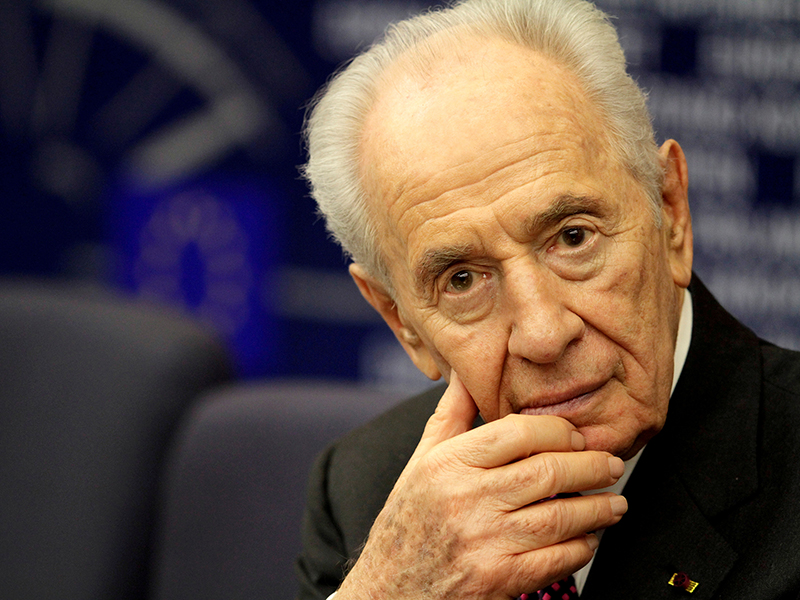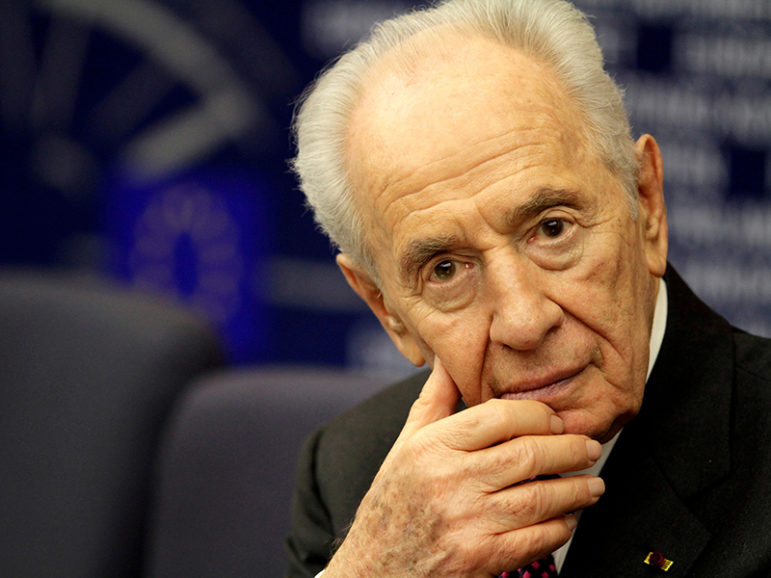
Shimon Peres attends a news conference at the European Parliament in Strasbourg, France, on March 12, 2013. Photo courtesy of Reuters/Jean-Marc Loos/File Photo *Editors: This photo may only be republished with RNS-SALKIN-OPED, originally transmitted on Sept. 28, 2016.
(RNS) This has been a bad summer for the Jewish people.
As summer began, we lost Elie Wiesel, our greatest moral statesman.
And now, as autumn begins, and the Jewish New Year approaches, we have lost Shimon Peres, our greatest political statesman. Peres was the last of the founders of the state of Israel — a man who embodied everything that the Jewish state is and wants to be.
There was hardly a significant role he didn’t occupy: minister of defense, minister of foreign affairs, minister of finance, minister of transportation, prime minister and, ultimately, president.
Like all great men, his life was a tangle of controversy and contradictions — which is why he had more than his share of critics, both on the left and on the right. Read my friend and teacher Yehuda Kurtzer’s assessment of that legacy.
We shall not see the likes of Peres again.
And yet, the Jewish tradition says that the truly righteous do not need monuments of stone. Their words are their monuments.
So, let’s listen to the best things that he ever said.
- Look, we have existed for 4,000 years — 2,000 years in diaspora, in exile. Nobody in the Middle East speaks their original language but Israel. When we started 64 (now, 69) years ago, we were 650,000 people. So, you know, we are maybe swimming a little bit against the stream, but we continue to swim.
Peres knew that Jewish history is what I have called “salmon Judaism” — swimming upstream against the tides of history.
The Jews struggle. Peres knew that.
- It’s better to be controversial for the right reasons, than to be popular for the wrong reasons.
Peres was right — and this statement is a “first cousin” to the previous one.
Peres was not only making that statement about persons. He was also making that statement about a people — the Jewish people.
He knew that the situation of the Jewish people — and the Jewish state — would always be precarious.
He knew that the state of Israel needed to survive and thrive, and that this might mean that she would not be winning any popularity contests.
- Israel is moving from the realm of poetry to the realm of prose.
Zionism began with poetry — the poetry of Jewish hopes, the poetry of Jewish activism, and the poetry of a people returning to its land.
But, a people always moves from poetry to prose — from a lyrical vision, to the more mundane tasks of maintaining a nation-state that emerges from that poetry.
Peres worked overtime in maintaining that balance between poetry and prose — and he navigated both those realms with elegance.
- You don’t make peace with friends. You make it with very unsavory enemies.
Peres was right. As tempting as it might be to have all of our opponents come to the table to sing kumbaya (or Hiney Ma Tov — “how good it is for brothers and sisters to sit together in unity”), Peres was too pragmatic for that.
We cannot wait until the hearts and minds of our enemies become magically changed. We go forward and make the best deal that we possibly can.
- There are two things that cannot be achieved in life unless you close your eyes a little bit. And that’s love and peace. If you want perfection you won’t obtain either of them.
See above quote.
- We should use our imagination more than our memory.
Is Peres right? To proclaim this truth as we enter our season of memory?
Here is the problem with Jewish memory. It should invigorate us. But, all too often it becomes nostalgia, a mere foraging around for goodies from the past.
Or, even worse, it becomes negative memory, that is only interested in rehearsing the historical wrongs that have been done to us — both as a people, and as individuals.
Peres is, ultimately, right. If memory amuses or cripples us, go to imagination.
- You’re as young as your dreams, not as old as your calendar.
In a satirical video made after he stepped down from the presidency, Peres explains his experience to a clueless employment counselor.
https://www.youtube.com/watch?v=7bQxhMfBziY
Can you think of another world leader (President Obama comes pretty close) who was so fundamentally unable to take himself seriously?
We loved him for his gentle demeanor, and his determination.
Peres reminded us that humility, human and humor all come from the same root.
- The purpose of life is to find a cause that’s larger than yourself, and then to give your life to it.
That was Shimon Peres.
It should be all of us.
May his memory be a blessing, and an inspiration, and a goad.
(Rabbi Jeffrey Salkin writes the “Martini Judaism” column for RNS)






